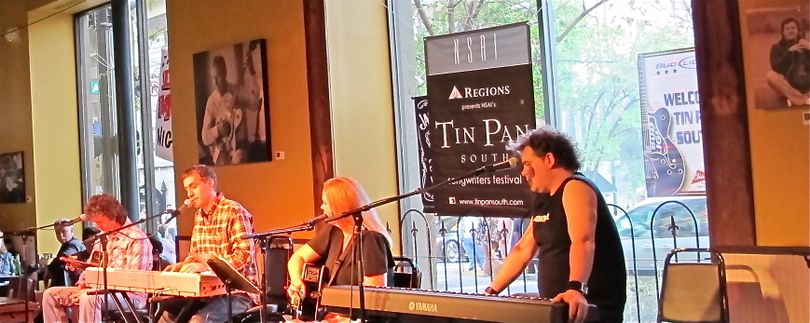Regie Hamm: A Song of Second Chances

Walking down the streets of Nashville, it’s not uncommon to see a star; an artist stepping out of a studio or having a beer at a downtown watering hole. You might see them in the grocery store or jogging through the neighborhood. Nashville is that kind of town. Most are famous for the songs they’ve sung, but the thing most people forget is that most of those songs were hammered out by other people. Men and women who put happiness, hard work and heartbreak down on paper, one note, one chord, one word at a time.
Tin Pan South is the songwriter’s time to shine.
Once a year Nashville fills the Honkytonks, the cafes, the dives and auditoriums with the talent behind the talent. Songwriters, not necessarily the names and faces you associate with well-known songs, gather to perform. It’s fun to watch and interesting to occasionally spot a famous face, a famous fan of the relatively unknown man or woman on the stage, standing in the crowd. They are there, like the rest of us, to see the masters at work.
On my last night in Nashville, I sat in the crowd at Puckett’s, just up the hill from the old Ryman Auditorium. On the stage, four musicians, the featured songwriters of the evening - Regie Hamm, Karen Staley, Billy Kirsch and Wil Nance, and laughed and joked and sang. Regie Hamm was the spokesman for the group.
Each took a turn playing and singing a song they’d written. But what made it so interesting were the stories they shared, the stories behind the songs. It’s funny what can happen to a song, like any offspring, when it leaves home. Ballads become rock and roll. Hard rock tunes turn mellow, intimate.
“As a writer, I say my piece and then let it go,” Hamm told me later. “I've had to learn how to allow the song to live on its own, without me. I can't know how people will react to it or how the message will be received.”
That can’t be easy.
At the end of the evening Hamm, having saved his best work for last, began to talk. He had a song, and a story, he wanted to share.
“This is a cruel business,” he said. “It can kill you.”
“One minute you’re riding high and the next you’re as low as you can get.”
He should know. He’s been there.
In 2003, with an album climbing the charts, he and his wife traveled to China to adopt a baby girl. They were gone less than a month but when they returned their world was already beginning to spin out of control. His song was pulled, tour dates were cancelled and the big money never showed up. Hamm went from being the next big thing to just another artist trying to get a gig.
But the biggest blow was the discovery that their daughter had a rare genetic disorder. Angelman Syndrome. They lost their home and faced a landslide of medical bills.
Hamm grieved for what was lost and what would never be.
Hamm’s wife asked him to write a song - something she’d never done before - for the American Idol songwriting contest. At first, Hamm wasn’t interested. She persisted and finally, a week before the deadline, more excited about the furniture store jingle he’d been hired to compose, a jingle that would bring in a guaranteed $500, Hamm sat down to write. He wrote what he thought would win, words about happy endings and fairy tales come true. And then he stopped.
“I realized I didn’t believe any of it,” he said.
So, he started over and wrote what he’d learned. Life isn’t fair but it’s all we’ve got. And, even when it hurts, life is worth celebrating.
He paid the $10 entry fee and sent it along with the song.
There were 40,000 entries but Hamm’s song won.The song was “This is the Time of My Life.”
Idol winner David Cook recorded it. It spent 16 weeks on the top of the charts. Oprah blessed it. The song was played at the closing ceremony at the 2008 Olympics in Beijing, a particularly bittersweet moment for Hamm.
“We’d said we would return for the Olympics, with our daughter,” he said. “That was before.”
For Hamm it was a second chance.
“Sometimes, you get surprised and someone takes your song to a new level with an amazing performance,” Hamm said. “That is always a blessing and is often the rush that keep you writing another day.”
I left the show that evening and walked back to my hotel - a nobody in a city of somebodies - wondering how many people have listened to Hamm’s song, connected with it on some level, hummed along, tapping the steering wheel with their fingers as it played. People like me who had no idea what led to its creation but felt the power of peace and acceptance in every word. I walked on, filled with gratitude for people like Regie Hamm. People who are willing to live out loud and put it all down on paper - the good and the bad and the sheer, blind, hope that keeps us going.
Information about the Pacific NW Angelman Syndrome Foundation
Cheryl-Anne Millsap writes for The Spokesman-Review. Her essays can be heard on Spokane Public Radio and on public radio stations across the country. She is the author of “Home Planet: A Life in Four Seasons” and can be reached at catmillsap@gmail.com